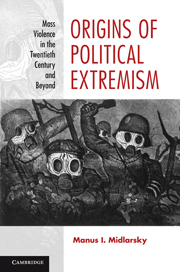Preface
Published online by Cambridge University Press: 05 June 2012
Summary
Doing the research for and writing this book has been an adventure. Never did I suspect that I would be exploring in detail the early years of Stalin in Georgia and elsewhere in the Caucasus. Nor that I would find similarities between the attitudes toward Islam of an old Abkhazian Muslim in Batum (then in Russia on the Turkish border) who sheltered the young Stalin and certain Indian Muslim thinkers. Nor that data on Nazi perpetrators of genocide, or Romanian electoral data during the interwar period would prove to be so helpful. Nor that the outcome of the Crimean War and the experience of Turkish officers in Adrianople (today's Edirne) at the end of the Second Balkan War would help explain later extremist behavior towards the Armenians. Little-understood (at least in the West) events can be crucial in predicting later vastly disproportional consequences. And in one instance at least, these events led me to veer from my early confident treatment of communism as a separate path of extremism, quite distinct from fascism, to a realization that, despite differences detailed in this book, there exists a common etiological core.
At a more personal level, I was surprised to have two anomalies clarified, one of a more general nature, the other quite specific. First, after doing the research and writing it became clear to me why the Bible, despite its antiquity and fabular nature, is still, to my knowledge, the best-selling book in the world.
- Type
- Chapter
- Information
- Origins of Political ExtremismMass Violence in the Twentieth Century and Beyond, pp. xi - xiiPublisher: Cambridge University PressPrint publication year: 2011

